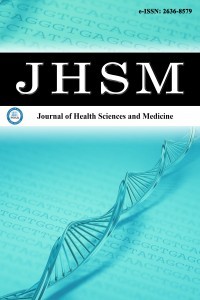Evaluation of the health literacy level of the patients who applied to a tertiary hospital family medicine clinic
Aim: This study aimed to reveal the level of health literacy of the patients who applied to the family medicine clinic of a tertiary hospital in Turkey and its relationship with demographic parameters.
Material and Method: This study is a cross-sectional descriptive study. Study conducted in the family medicine clinic of an education hospital. Demographic characteristics and health literacy levels of the participants such as age, gender, marital status, educational status, professions, and financial status were noted. The health literacy levels of the participants were determined by using the Turkish Health Literacy Scale-32.
Results: A total of 443 participants were included in the study. the median age of the participants was 36. The median health literacy of the participants was 33.9 (25th and 75th quartiles: 29.2-40.8). The health literacy index of 57 (12.9%) participants were inadequate 139 (31.4%) participants was problematic, 147 (33.2%) participants were sufficient, and 100 (22.6%) participants was excellent. There was a statistically significant, negative, and weak correlation between age and health literacy index. (r=-0.200, p=0.01, Spearman correlation test).
Conclusion: Low health literacy is an important public health problem. Health literacy can be considered a priority policy issue. Legal arrangements can be made to carry out activities for health literacy.
Keywords:
Health Education, Public Policy Health Literacy,
___
- Simonds SK. Health education as social policy. Health Educ Monograph 1974; 2: 1-25.
- Health literacy: Report of the council on scientific affairs. Ad hoc committee on health literacy for the council on scientific affairs, American Medical Association. JAMA 1999; 281: 552-7.
- Durusu Tanrıöver M, Yıldırım HH, Demiray Ready FN, Çakır B, Akalın HE. Turkey Health Literacy Survey. Health and Social Workers Union; Ankara, 2014. Available from: http://www.sagliksen.org.tr/cdn/uploads/gallery/pdf/8dcec50aa18 c21cdaf86a2b33001a409.pdf
- Okyay P, Abacıgil F. Turkish Health Literacy scales reliability and validity study 1. Edition. Ankara 2016; 1-104
- Şantaş G. Health Literacy Studies in Turkey: a content analysis for graduate theses. TFSD 2021; 2: 54-60.
- Berkman ND, Sheridan SL, Donahue KE, Halpern DJ, Crotty K. Low health literacy and health outcomes: an updated systematic review. Ann Intern Med 2011; 155: 97-107.
- Sørensen K, Pelikan JM, Röthlin F, et al. Health literacy in Europe: Comparative results of the European Health Literacy Survey (HLS-EU). EJPH 2015; 6: 1053-8.
- Nakayama K, Osaka W, Togari T, et al. Comprehensive health literacy in Japan is lower than in Europe: a validated Japanese-language assessment of health literacy. BMCPH 2015; 15: 505.
- Özdemir S, Akça HŞ, Algın A, Kokulu K. Health literacy in the emergency department: a cross-sectional descriptive study. Eurasian J Emerg Med 2020; 19: 94-7.
- Berberoğlu U, Öztürk O, İnci MB, Ekerbiçer HÇ. Evaluation of Health Literacy Status of Individuals aged 18-65 years registered in a Family Health Center. Sakarya Med J 2018; 8: 575-81.
- GözlüK, Kaya S. Evaluation of health literacy level of patients applied to family health centers: the case of Cankaya district. Ankara Med J 2020; 20: 254-68.
- Özdemir S, Algın A. How will the health literacy and crowded emergency room be affected after the COVID-19 pandemic? Phnx Med J 2021; 3: 50-50.
- Baker DW, Gazmararian JA, Sudano J, Patterson M. The association between age and health literacy among elderly persons. J Gerontol B Psychol Sci Soc Sci 2000; 55: 368-74.
- Durmaz S, Sürücü EE, Özvurmaz S. Mermer fabrikası işçilerinde sağlık okuryazarlığı, sağlık algısı düzeyleri ve ilişkili faktörlerin belirlenmesi. Med Sci 2020; 15: 81–91.
- Yakar B, Gömleksiz M, Pirinççi E. Bir üniversite hastanesi polikliniğine başvuran hastaların sağlık okuryazarlığı düzeyleri ve etkileyen faktörler. Euras J Fam Med 2019; 8: 27-35.
- Ilgaz A. Bir Aile Sağlığı Merkezi’ne kayıtlı bireylerde sağlık okuryazarlığı seviyesi ve ilişkili faktörler. Hacettepe Üniversitesi Hemşirelik Fakültesi Derg 2021; 151-9.
- Arendt JN. Does education cause better health? A panel data analysis using school reform for identification. Economics of Educ Rev 2005; 24: 149-60.
- Yayın Aralığı: Yılda 6 Sayı
- Başlangıç: 2018
- Yayıncı: MediHealth Academy Yayıncılık
Sayıdaki Diğer Makaleler
Nihal MAVRAL, Pınar KIRICI, Kadriye YAKUT, Filiz AVŞAR
Canan GÜRSOY, Özge ORAL TAPAN, Emrah DOĞAN, Turhan TOGAN, Semra DEMİRBİLEK
Dilek TEZCAN, Çağrı TURAN, Sema YİLMAZ
Berna UCAN, Hasibe Gökçe ÇINAR
Feray Ferda ŞENOL, İlkay BAHÇECİ, Nuray ARSLAN, Özlem AYTAÇ, Pinar ÖNER, Zülal AŞCI TORAMAN
Şeyhmus BAKIR, Samican ÜNAL, Veysel ERATİLLA
Özlem ARMAN BİLİR, Namık Yaşar ÖZBEK
Haluk Tarık KANİ, Çağlayan KEKLİKKIRAN, İlkay ERGENÇ, Yusuf YILMAZ
